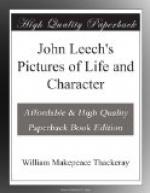and Bob the dustman; good-naturedly spies out Molly
the cook flirting with policeman X, or Mary the nursemaid
as she listens to the fascinating guardsman. He
used rather to laugh at guardsmen, “plungers,”
and other military men; and was until latter days
very contemptuous in his behavior towards Frenchmen.
He has a natural antipathy to pomp, and swagger, and
fierce demeanor. But now that the guardsmen are
gone to war, and the dandies of “The Rag”—dandies
no more—are battling like heroes at Balaklava
and Inkermann* by the side of their heroic allies,
Mr. Punch’s laughter is changed to hearty respect
and enthusiasm. It is not against courage and
honor he wars: but this great moralist—must
it be owned?—has some popular British prejudices,
and these led him in peace time to laugh at soldiers
and Frenchmen. If those hulking footmen who accompanied
the carriages to the opening of Parliament the other
day, would form a plush brigade, wear only gunpowder
in their hair, and strike with their great canes on
the enemy, Mr. Punch would leave off laughing at Jeames,
who meanwhile remains among us, to all outward appearance
regardless of satire, and calmly consuming his five
meals per diem. Against lawyers, beadles, bishops
and clergy, and authorities, Mr. Punch is still rather
bitter. At the time of the Papal aggression he
was prodigiously angry; and one of the chief misfortunes
which happened to him at that period was that, through
the violent opinions which he expressed regarding the
Roman Catholic hierarchy, he lost the invaluable services,
the graceful pencil, the harmless wit, the charming
fancy of Mr. Doyle. Another member of Mr. Punch’s
cabinet, the biographer of Jeames, the author of the
“Snob Papers,” resigned his functions on
account of Mr. Punch’s assaults upon the present
Emperor of the French nation, whose anger Jeames thought
it was unpatriotic to arouse. Mr. Punch parted
with these contributors: he filled their places
with others as good. The boys at the railroad
stations cried Punch just as cheerily, and sold just
as many numbers, after these events as before.
* This was written in
1854.
There is no blinking the fact that in Mr. Punch’s
cabinet John Leech is the right-hand man. Fancy
a number of Punch without Leech’s pictures!
What would you give for it? The learned gentlemen
who write the work must feel that, without him, it
were as well left alone. Look at the rivals whom
the popularity of Punch has brought into the field;
the direct imitators of Mr. Leech’s manner—the
artists with a manner of their own—how
inferior their pencils are to his in humor, in depicting
the public manners, in arresting, amusing the nation.
The truth, the strength, the free vigor, the kind
humor, the John Bull pluck and spirit of that hand
are approached by no competitor. With what dexterity
he draws a horse, a woman, a child! He feels
them all, so to speak, like a man. What plump
young beauties those are with which Mr. Punch’s




